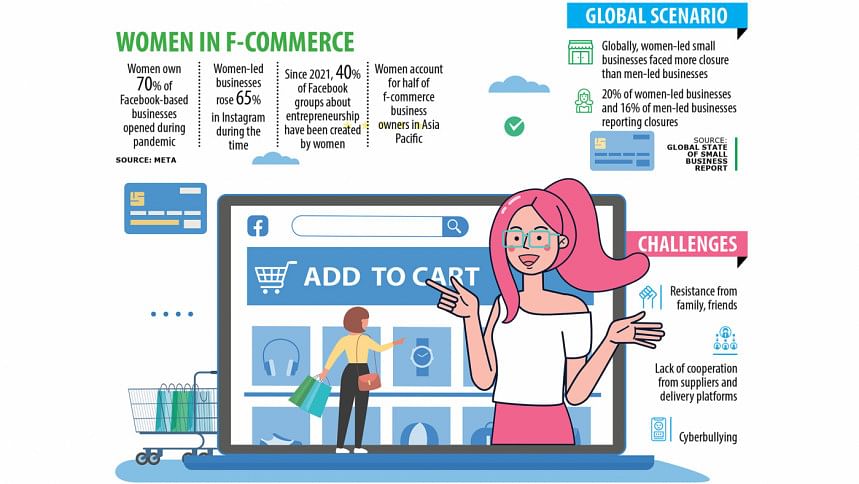Women take lead in f-commerce

Since the Covid-19 pandemic crippled many businesses and impacted livelihoods of thousands, many were forced to resort to alternative means of income including exploring alternative channels.
Facebook-based business or f-commerce seemed to be a viable means of income in these perilous times. Individuals, particularly women, took this as an opportunity to start new businesses or grow their existing ones.According to Meta, women owned 70 per cent of Facebook-based businesses opened since the pandemic began and there has been an increase of more than 65 per cent in Instagram businesses owned by women.
This information was made public in a press release by Meta celebrating Bangladeshi women coming together online to empower others and drive positive change on the occasion of International Women's Day 2022.
Nahian Ibnat Beg, founder of Trivents, started her event management business through Facebook and Instagram.
"We started around the pandemic and have used Facebook and Instagram ever since to showcase our designs and services. There were uncertainties but through our excellent service we are still able to keep on growing," she said.
Zerin Tasnim Khan, founder of 6 Yards Story, mentioned how she had to diversify her business to stay relevant during the pandemic.
"During the pandemic, we tried to diversify our online jewellery business and delivered medicines and other essential items. Since the pandemic, we have returned to business as usual and have been doing well," she said.
Some businesses completely switched their modality to online in order to stay afloat during the pandemic.
"During the pandemic, we relied on our Facebook group to keep our business running. We tried to ensure quality local products through our platform for the customers, including NRBs," said Sabera Anwar, founder, Go Deshi - Made in Bangladesh.
Meta, formerly known as Facebook, also informed that, since 2021, 40 per cent of Facebook groups about entrepreneurship in Bangladesh have been created by women.
However, building these businesses and achieving growth was not easy, particularly during the pandemic.
According to a study conducted by Halima Haque, an assistant professor at Jahangirnagar University, on "Women's Empowerment through F-Commerce during the Covid-19 Pandemic", women entrepreneurs on Facebook had seen increased complexities dealing with the supply chain including deliveries and obtaining raw materials.
Moreover, research also illustrates how women in f-commerce had to undergo scrutiny, internal and external pressure, cyberbullying etc to keep their business operational.
These had been echoed by many f-commerce entrepreneurs.
"Our business grew quite a few folds, but this growth was not easy," said Esrat Jahan Anika, owner of Zilbab Attire, a Facebook-based Islamic-wear seller.
"We had to deal with delivery platforms and suppliers. They initially tried to press higher costs as they thought we had no other option," she said.
"But they would not do that to a male relative of mine. Upon confronting them, they later lowered the price," said Anika.
However, industry experts say the challenges to growth of women-led businesses in f-commerce as well as e-commerce is growing in Bangladesh.
"It's true that women are doing well in f-commerce," said Mohammad Sahab Uddin, vice president, e-Commerce Association of Bangladesh (e-CAB).
"During the pandemic, women have taken up entrepreneurship and they have switched to online-based businesses," he said.
"The e-CAB community has 27 per cent women entrepreneurs, which goes to show that women are contributing fairly well in the economy," he added.


 For all latest news, follow The Daily Star's Google News channel.
For all latest news, follow The Daily Star's Google News channel. 








Comments